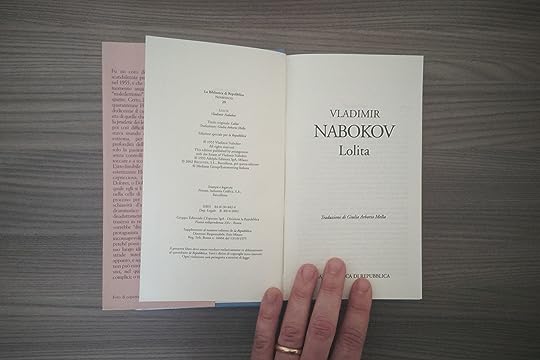What do you think?
Rate this book


368 pages, Paperback
First published September 1, 1955


You see, she had absolutely nowhere else to go.
After dusty years in my bookshelf, finally I decided to read "Lolita". I am blown away by this Vladimir Nabokov's work, ironic and dramatic at the same time. I am not shocked, nor I have found those disastrous tones of an announced tragedy that I was expecting from this book. Indeed Nabokov tells us that this work:
"... brings along no moral. For me a work of fiction exists only if it gives me what I frankly shall call aesthetic pleasure."The main character, Humbert, describes in a precise and often sarcastic way his syndrome, i.e. the uncontrollable attraction towards those he defines "nymphets" based on a rigorous combination of age, attitude and style of dress, a lethal mix that can catapult him into an abyss of irrationality. Some "normal" dalliances had in adolescence or adulthood are worthless. Something is wrong in our antihero, which plans convenience marriages or improbable assassinations just to satisfy his ecstatic passion. Playing the dual role of fugitive and pursuer in a long road trip, the wretched fate of a grotesque man takes place. A man that until the end is unable to control his insane and delirious love.
But still love.
Vote: 8

Dopo anni di polverosa presenza nel mio scaffale, decido con moderato entusiasmo di leggere questo libro. Ironico e drammatico al contempo, quest'opera di Vladimir Nabokov mi ha spiazzato. Non mi sono scandalizzato, né ho ritrovato quei toni funesti da tragedia annunciata che il titolo "Lolita" sempre suscitava in me. D'altronde ci dice Nabokov che la sua opera:
"... non si porta dietro nessuna morale. Per me un'opera di narrativa esiste solo se mi procura quella che chiamerò francamente voluttà estetica".Il protagonista, Humbert, descrive in maniera precisa e spesso sarcastica la sua sindrome, l'attrazione irrefrenabile verso coloro che definisce "ninfette" sulla base di una rigorosa combinazione di età, atteggiamento e modo di vestire, un mix letale in grado di scaraventarlo in un abisso di irrazionalità. A nulla valgono esperienze relazionali "normali" avute in adolescenza o in età adulta. Qualcosa non quadra nel bell'Humbert, che progetta matrimoni di convenienza o improbabili assassinii pur di soddisfare la sua estatica passione. Rivestendo il duplice ruolo di fuggiasco ed inseguitore in un lungo viaggio on the road, si compie il gramo destino di un uomo grottesco, incapace fino all'ultimo di dominare il suo amore insano e delirante.
Ma pur sempre amore.
Voto: 8
The passion I had developed for that nymphet, for the first nymphet in my life that could be reached at last by my awkward, aching, timid claws, would have certainly landed me again in a sanatorium, had not the devil realized that I was to be granted some relief if he wanted to have me as a plaything for some time longer.
We loved each other with a premature love, marked by a fierceness that so often destroys adult lives.
the double rumble is, I think, very nasty and suggestive. It is a hateful name for a hateful person. It is also a kingly name, and I needed a royal vibration for Humbert the Fierce and Humbert the Humble.The double rumble also exists with couples like John and Jean or Leslie and Louise to denote a cohesion of two individuals into a cumulative force of The Couple.
I recall certain moments, let us call them icebergs in paradise, when after having had my fill of her –after fabulous, insane exertions that left me limp and azure-barred–I would gather her in my arms with, at last, a mute moan of human tenderness (her skin glistening in the neon light coming from the paved court through the slits in the blind, her soot-black lashes matted, her grave gray eyes more vacant than ever–for all the world a little patient still in the confusion of a drug after a major operation)–and the tenderness would deepen to shame and despair, and I would lull and rock my lone light Lolita in my marble arms, and moan in her warm hair, and caress her at random and mutely ask her blessing, and at the peak of this human agonized selfless tendernessThere is a sense of remorse for his actions that sprout through his narrative in the later portion of the novel and ask us to rethink our earlier perceptions. This account of intercourse reveals one that is not as one of willful harmony but aggressive assertion of dominance over a passive partner.

